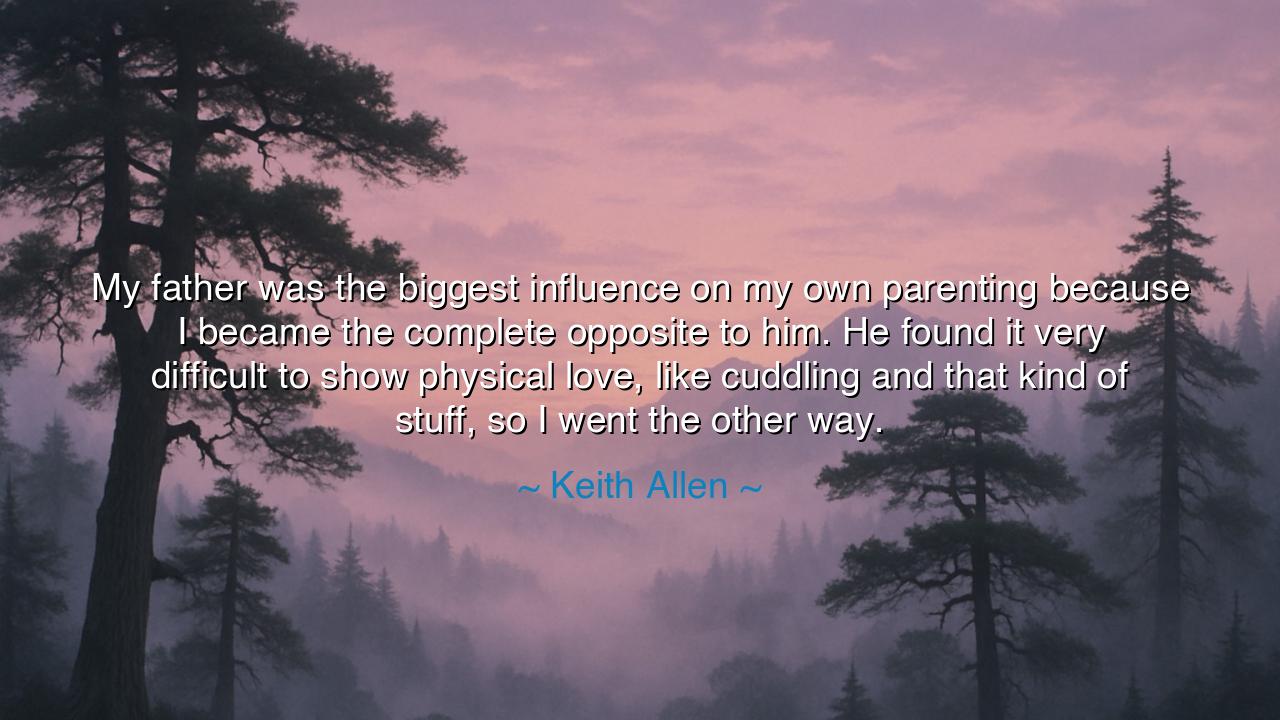
My father was the biggest influence on my own parenting because
My father was the biggest influence on my own parenting because I became the complete opposite to him. He found it very difficult to show physical love, like cuddling and that kind of stuff, so I went the other way.






Keith Allen, in a confession both tender and profound, once declared: “My father was the biggest influence on my own parenting because I became the complete opposite to him. He found it very difficult to show physical love, like cuddling and that kind of stuff, so I went the other way.” In these words lies a truth that resounds across generations: that the legacy of our parents shapes us, whether through imitation or resistance. Sometimes we follow their path, carrying forward their virtues; at other times, we build strength by rejecting their shortcomings, vowing to give our children the love we ourselves hungered for.
The origin of this truth lies in the mysterious bond between parent and child. Allen speaks not with bitterness, but with clarity. His father’s restraint, his inability to show affection, became the soil from which a different style of parenting grew. He did not allow himself to be chained to the patterns of the past; instead, he transformed them. Where his father was distant, he became warm. Where his father withheld affection, he gave it freely. In this paradox lies the power of human will—the power to turn pain into love, absence into presence, and silence into embrace.
History offers us many examples of this same transformation. Consider Abraham Lincoln, who grew up under the shadow of a stern and sometimes distant father. Lincoln himself spoke of their strained relationship. Yet, in his own life, he became a man of empathy and deep feeling, not because his father taught him tenderness, but because life itself compelled him to cultivate the very virtues he had long missed. Like Allen, he chose not to repeat what he received, but to walk another road.
Allen’s words also remind us that influence does not always mean replication. Too often we think of influence as direct inheritance: a father teaches, and the son becomes like him. But Allen teaches us that influence is more complex. Sometimes the most powerful lesson a parent gives is the one that comes through their absence. A cold father can teach the warmth of love, just as a broken household can inspire the building of a strong one. Influence, then, is not destiny—it is a mirror in which each child must decide whether to follow the reflection or to turn away.
His statement carries also a message of redemption. For though his father could not show physical love, Allen does not let that define the future. Instead, he redeems his father’s legacy by reversing it. By choosing to embrace, to cuddle, to love openly, he heals not only his children but also himself. In giving what he was denied, he proves that no cycle is unbreakable, no past unchangeable. This is the great truth of parenting: that each generation is given the chance to write a new story, to repair the wounds of the old.
The lesson is clear: you are not bound to repeat the mistakes of your parents. Honor the good they gave you, but do not fear to turn away from what harmed you. If they were silent, be a voice. If they were cold, be a fire. If they were distant, be a presence. Your children need not inherit your wounds; they may instead inherit your healing. In this lies the noblest form of love—the choice to end the cycle of pain and to replace it with tenderness.
Therefore, let Keith Allen’s words be remembered: “My father was the biggest influence on my own parenting because I became the complete opposite to him.” Influence does not mean imitation; it means opportunity. Every parent, whether nurturing or neglectful, leaves a mark. But it is you, in your freedom, who decide whether to repeat or to transform. Choose always the path of love. For in choosing differently, you prove that the past need not chain the future, and that through you, your children may inherit not sorrow, but joy.






AAdministratorAdministrator
Welcome, honored guests. Please leave a comment, we will respond soon